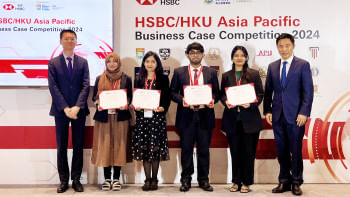Navigating business case competitions as a non-business student

When we think of business case competitions, it probably sounds like something that our marketing-major friends are meant to participate in. But what if you too could solve real-world business problems despite never having attended a finance or marketing class? That's exactly what business case competitions offer – an opportunity to step into the shoes of a strategist, marketer, or consultant, regardless of your academic background. Although it may sound counterintuitive, students from non-business backgrounds can also do well in business case competitions because they bring a unique perspective to the problems that are being solved.
What exactly is a business case competition though? Let's say a company presents a real-world challenge: maybe it's figuring out how to expand into a new market, reduce adverse environmental impact, or improve customer engagement. Your team's task is to analyse the problem, brainstorm solutions, and present a strategy within a given deadline. While business knowledge is helpful, it's not a requirement. The best teams combine different skill sets – data analysis, storytelling, critical thinking, and creativity – to come up with effective solutions.
Case competitions come in many formats, including sustainability challenges, tech-focused cases, and social impact initiatives, meaning there's something for everyone.
"Business cases are just about finding smart solutions with limited resources, and the best teams aren't made up of just business students. They need people to break down problems, designers to make things visually appealing, and all kinds of perspectives to think outside the box. Business isn't just about theories – it's about practical problem-solving, and that's a skill anyone can develop," said Mohammad Shadman Islam, a Computer Science and Engineering student at North South University (NSU) who has been a part of teams that have won and been the finalists at numerous business competitions all over Bangladesh, including HULT Prize at North South University 2023 and 2024, Brand Master 3.0, MindSparks 23, BrandEdge 2025, and many more.
However, navigating business case competitions as a non-business student is not without hardships. The first obstacle is the lack of technical knowledge which can make business jargon and industry-specific metrics sound like gibberish. Thus, it is important to learn the basics quickly. Watching YouTube breakdowns of business case competitions, taking free online courses on Coursera or Khan Academy to understand financial statements and strategy frameworks, and reading articles from publications like the Harvard Business Review to familiarise yourself with business language are all effective methods.
Adib Muttaki, a Mechanical Engineering student at Khulna University of Engineering & Technology (KUET), and the team leader of project PENTABLE, which secured a top-eight finish at the regional finals of the HULT Prize 2024, provided some insight on how to overcome this barrier. "It is a trial-and-error experience, and persistence is the key. Since we were learning all these concepts as a team, it felt less like a burden and more like a fun challenge. I collected slides from previous competitions, attended workshops, and studied materials covering the basics of business. We learnt from wherever we could. Over time, these concepts started to make sense."
Shadman echoed, "At first, jumping into a business case competition felt like diving into the deep end of a pool without knowing how to swim. The only strategy I had was 'don't sink'. I wasn't fluent in business lingo, and terms like EBITDA and synergy sounded more like names of alien planets than something I needed to understand. But instead of overthinking it, I approached it like any science student would – identify what I don't know, break it down, and help my learning."
In addition, limited exposure to business frameworks, like SWOT analysis, Porter's Five Forces, and market segmentation, and competing against business students who have studied these concepts for years can be intimidating. While these may feel like significant drawbacks, there are strategies one could implement to excel at business case competitions. Firstly, it is important to leverage your unique strengths. A psychology student might be able to analyse consumer behaviour more deeply than a business student can. A computer science major might automate a process that others wouldn't even consider. Liberal arts students may be skilled at crafting impactful narratives. The best teams harness these diverse perspectives.
"While I didn't have the business expertise that some of my teammates at Team Roshmalai had, I approached problems in a way that felt natural to me, similar to how I would tackle an engineering problem. My engineering brain naturally broke the problem down like a flowchart: What's the issue? What are the constraints? What's the most efficient solution?" Shadman added.
"I found that I felt at ease when participating in sustainability-themed competitions because of my background in development economics. Despite being different domains, I participated in these competitions because the idea of sustainability is almost universal across all fields," said Ayon Ghosh, a recent Economics graduate of East West University, who has participated in various case competitions as an undergraduate student.
"As engineering students, when we come up with an idea, our first instinct is to test its feasibility in real life, rather than just theorising. For the competition, we didn't just propose a solution – we built a working prototype on campus. With access to resources and guidance from our professors, we could test our ideas and back them up with real-world data. This practical, hands-on approach gave us an edge and helped us stand out in the competition," said Adib, when asked if their STEM background had given his team an edge in the competition.
Additionally, communication plays a huge role too – stick to simple, clear language when sharing ideas, and steer clear of jargon that might throw people off, which is why working on your presentation skills is essential. This includes making slides, giving an elevator pitch, and speaking about your ideas in a way that conveys the idea clearly and engages the audience.
Shadman encourages students who are hesitant to participate in case competitions because of their major to go for it. "It's actually fun once you stop stressing over fancy business terms and focus on the challenge itself. It's only a matter of time before you realise that case competitions are basically real-life strategy games."
At the end of the day, case competitions aren't just for business majors – they're for anyone willing to tackle challenges, think critically, and work collaboratively. So, if you've ever hesitated to join one because of your major but still feel like business competitions could be your thing, take the leap.
Bipra Prasun Das studies Computer Science and Engineering at North South University. Email him at [email protected].

 For all latest news, follow The Daily Star's Google News channel.
For all latest news, follow The Daily Star's Google News channel. 









Comments